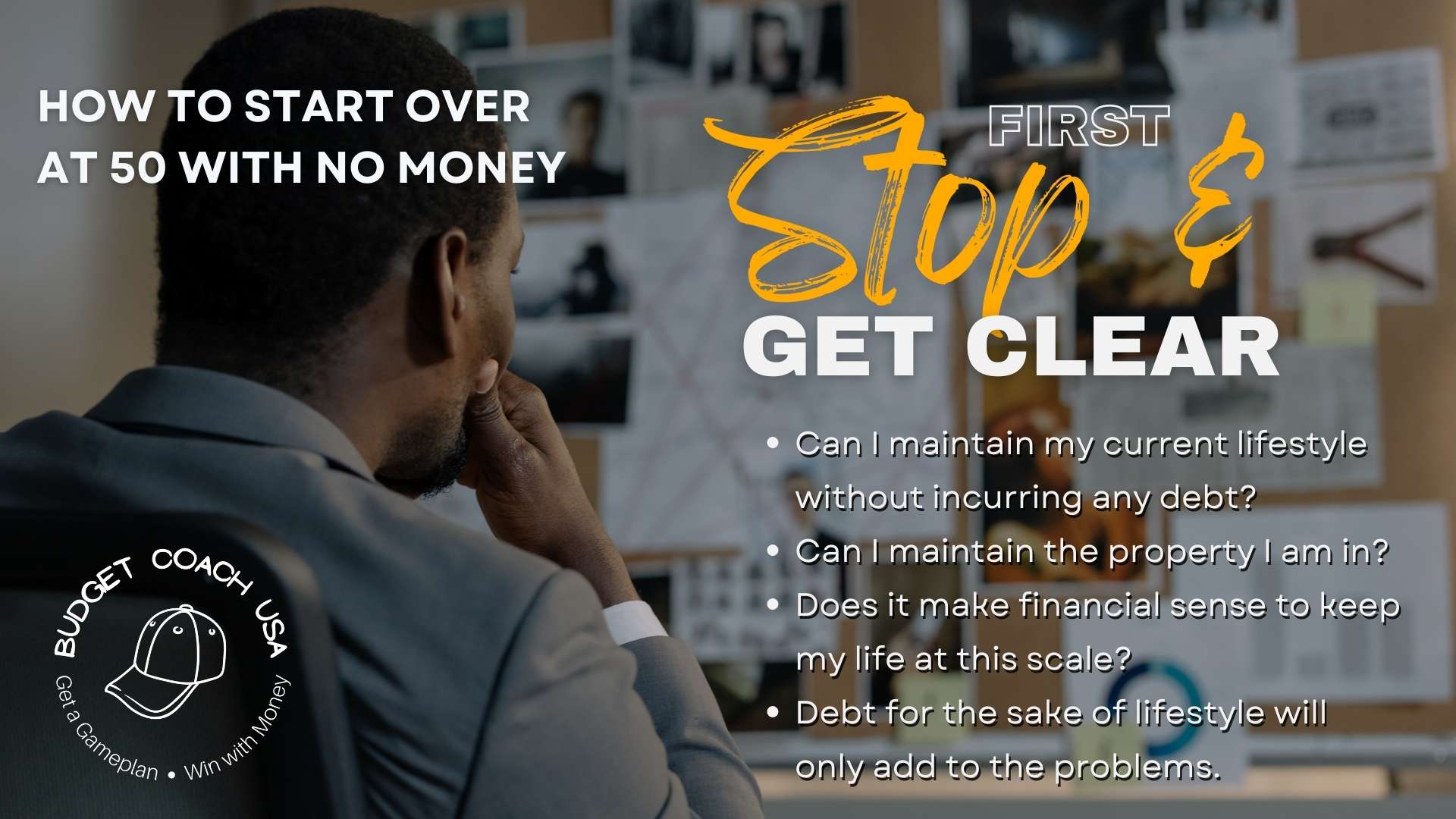Paying Off Student Loan Debt Fast Are you drowning in student loan debt and desperately looking for...
Starting Over at 50 and Broke
Whether it's due to financial setbacks or unexpected life events the reality of starting over at 50 when you are broke is frightening. After all, it took decades to build the life you had right? Well, yes but don't forget you are smarter now than you were when you were in your early 20s. With your life experience, connections, and knowledge base you can build back much more quickly. There is a lot to be said for experience and even though the idea of starting over at 50 and being broke is scary for good reasons, it is possible to rebuild your life and find financial success in your second act. Let's take a look at four concrete steps you can take to rebuild (financially) after 50, even when you are broke.
NOTE: This article is focused on concrete financial steps you can take to protect your finances now and in the future. If you find yourself at 50, broke, and needing to start over it is advisable that you also seek a qualified professional with which to discuss any mental health needs you may have.
4 Steps When You Are Starting Over at 50 and Broke
With the right mindset and strategies, you can rebuild your life from scratch and achieve financial stability even at 50. Here are some tips to guide you through the process.
Step 1. Stop. Get Clear
Regardless of the reason, staring over at 50 will be an emotional experience. You may have lost a loved one, experienced a relational separation or been released from a long-time career. Whatever the cause, the first thing to do is stop and get clear. Get clear about your financial position and if it is sustainable under your current lifestyle.
Don't Take on New Debt
If you remain where you are do have the resources to maintain your lifestyle or will it require going into debt? Incurring more debt will only make your challenges worse. There is a lot of wise and sage advice that will tell you not to make major decisions when you are in a crisis season of your life. And that advice is very good. However if, in the process of avoiding a major decision such as a move or career change, you are incurring additional debt you would be making a mistake. Making a move to downsize your life or change jobs or locations will be a difficult one, however, maintaining your financial stability is more important.
If Needed, Make the Difficult Choice to Protect Your Future
Stop and get clear about your financial situation and decide if a change is needed to keep from incurring debt.
- Can you continue to maintain your current home mortgage?
- Can you continue to handle the property maintenance and upkeep?
- Is your current job or career enough to continue your lifestyle
- Are you able to continue with school or tuition payments for your children?
- If you cannot continue your lifestyle, will you incur more debt attempting to do so?
Ultimately, no one wants to make major changes in their living standards in the middle of a crisis season. However, ignoring your circumstances and taking on debt will only make things worse. It may feel good for a moment, but when the bill comes due, you'll find more stress and anxiety than if you had downsized your living standard or upsized your career instead.

A caption that describes the image.
Step 2. Stabilize
When you find yourself starting over at 50 with no money, you may be tempted to make some impulsive decisions. Perhaps you feel freed from a previous situation that was troublesome or you are reaching out for comfort in material things during a time of grief.
Now that you've made the hard decisions over your lifestyle and income the best thing to do when starting over at 50 is to focus on stabilizing your life financially and with a support network.
Build a Zero-Based Budget
If your restart at 50 has left you looking for answers we understand. In the process, the best thing you can do for your finances is to build and operate on a zero-based budget. A zero-based budget will allow you to predict with the best certainty available your financial future because it will assign a job to and account for every dollar of your income. A zero-based budget will make sure that you are living within your means and not overspending or incurring debt. Depending on your background and budgeting experience, you may need to learn new skills in buying groceries, saving for the future, or simply understanding the many money mistakes you should avoid. But be sure to operate your household finances from a zero-based budget. It will help you stabilize your financial life at the moment and give you the best opportunity for success going forward.
Establish an Emergency Fund
Once you've got your zero-based budget up and running be sure to include savings for an emergency fund. If you have no savings at all, begin with a $1,000 or $2,000 emergency fund. This will help you pay for emergencies with cash instead of reaching for a credit card. When your life and finances are stabilized you can begin to pay off any debt you may have. Your best ability to start over at 50 with no money is to eliminate your debt as soon as possible.
Find Social Outlets and Support Networks
Stabilizing your life when you find yourself starting over at 50 with no money is not just about finances. If you find yourself with a broken social network or starting over with a new job or new friends, be sure to find some social outlets and support networks. It is too easy to withdraw and become depressed. But keeping a group of friends and support groups around you will help you see out of your own situation and give you a target to aim for.
Take On an Overdue Hobby
As we raise families and nurture marriages and relationships over the years the list of things we would like to, but can't, do with our time grows and grows. It is just the nature of life and responsibilities. When you find yourself starting over at 50 with no money there may be some hobbies and activities on that list that you find you are able to begin. And here is the good news. It is a great decision at this point. You will need social and physical outlets at this time in your life. It is healthy and can provide a great boost to your effort in starting over.
.jpg)
A caption that describes the image.
Step 3. Protect
When you start over at 50 you'll want to remember to protect yourself with the proper insurance. Since your family dynamics may have changed, the insurance that used to protect you may not still be in place.
Protect Dependents with Term Life Insurance
If you have dependents still in your home be sure to protect them with Term Life insurance on yourself. Term Life insurance is different than Whole Life Insurance. Whole life should be avoided at all costs because it is simply a rip-off. Don't be fooled. Buy Term Life instead.
Protect Yourself with Long-Term Disability
Next, protect yourself with long-term disability insurance. long-term disability replaces a portion of your income in the event that you experience a qualifying event that keeps you from working. Since you are having to start over at 50 with no money, you won't be able to count on a partner to provide income if you can't. So a long-term disability policy will protect you as you begin to build your new life.
The last thing you want when starting over with no money is to let a loss steal your ability to build your new life. Proper insurance is a must.
.jpg)
A caption that describes the image.
Step 4. Rebuild
You've taken time to evaluate your potential need to downsize to avoid debt. You have stabilized your life with proper budgeting and support networks so that you can avoid new debt and keep encouraging people around your orbit so you can maintain a positive attitude and get the support you need.
Let's take a look at what to do next.
Think About What You Truly Want for Your Future
With the foundations set and your current situation stabilized and protected it is time to take a thoughtful look at what you want for the next phase of your life. Talk to people you trust and consider your past experience and skill set. Think about your interest and passions. Now is a great time to chart a new course and pursue that career you always wished you could.
Refine Your Budget and/ or Career to Match Your Goals
When you know what you want for your future align your budget and career choices to meet your goals. You are properly insured, have an emergency fund in place, and have protected yourself with the correct insurance. Now aim your budget and career choice to achieve the goals you've set. This is a great way to win with money when you are starting over at 50 and broke.
Use Your Network to Accelerate Your Plan
Engage your network to accelerate your plan. At 50 you have probably developed a good network and your professional and personal contacts would likely be very open to helping you start over. When you have taken a measured and wise approach to your new challenges you put yourself in the best position to succeed. So be sure to engage your network for assistance in making key contacts and getting the experience and introductions you need.
.jpg)
A caption that describes the image.
Maintain Your Financial Integrity with Smart Decisions and you can Win with Money Even When Starting Over After 50
Starting over at 50 with no money can be a challenge. But as we have discussed here, if you'll stay out of debt by downsizing if needed, protect yourself with an emergency fund and the proper insurance, and carefully plan your next steps you can succeed. The key is to avoid taking on debt and use a budget to plan your money carefully. Choose what you want most over what you want now.
7 Steps to Financial Wellness
- Save a starter emergency fund of $1,000 as fast as you can.
- Pay off your debt. Start by listing all of your debts except for your mortgage. Put them in order by balance from smallest to largest—regardless of interest rate. Pay minimum payments on everything but the little one. Focus on that one until it is gone. Then take that payment and put it toward the second-smallest debt, making minimum payments on the rest. That's what's called the debt snowball method, and you’ll use it to knock out your debts one by one until you are debt-free except for the house.
- Save a full emergency fund of 3 to 6 months of household expenses
- INVEST 15% of your gross income toward retirement.
- CONTRIBUTE to children’s college education fund.
- PAY off the house early.
- Build wealth and be generous.
Note: Steps 4,5 & 6 are worked on at the same time.
Budget Coach USA
Learn to Win with Money




